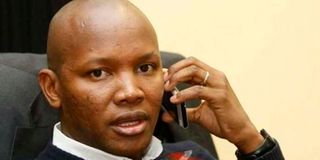‘Please call me’ inventor NKosana Makate wins another round in Sh75bn case

Nkosana Makate, 44, inventor of the “Please Call Me.
The South African “Please Call Me” inventor, NKosana Makate, won yet another round after a public protector ordered an independent auditor to fast-track the release of the financial statements of the cellular giant Vodacom.
The financial records will be used to determine Makate’s payout in a long-standing case in which he sued Vodacom for failing to adequately compensate him for the cell phone feature ‘Please Call Me’ which has since 2001 been used by prepaid phone users to send a free text asking to be phoned back.
Mr Makate is demanding R10 billion (Sh75 billion) compensation for coming up with the concept saying the R47 million (Sh354 million) paid to him was insufficient since the company had understated the profits drawn from his invention.
But to justify his demand, Mr Makate needs the actual financial statement of the telco, which he requested from the Independent Regulatory Board for Auditors (Irba) in 2018 but is yet to receive.
Pension funds
According to Sunday Times newspaper, Makate, among others, asked Irba to investigate “possible misstatement in the audited annual financial statements of Vodacom … relating to the extent of liabilities disclosed”. He also asked the regulator to investigate “concealment of possible criminality to the detriment of shareholders, such as investors, pension funds” ... and “misleading statements contained in Vodacom’s pre-listing statement [prospectus]”.
In January 2020, the inventor asked the office of the public prosecutor (Busisiwe Mkhwebane) to investigate Irba for “liability disclosure of Vodacom (Pty) Ltd with regard to the ‘Please Call Me’ matter”.
On October 22, the public protector found Irba guilty of maladministration in the complaint.
“We found that ... there was an undue delay on the part of the Irba to finalise their investigation into Mr Makate’s complaint,” Mkhwebane said in a recent ruling.
“It is, however, acknowledged that the investigation — from the time the matter was allocated to the senior investigator for investigation — was conducted and finalised within a reasonable period. The plan was approved or confirmed by the board during April 2020 and the investigation was concluded on 14 January 2021. That is nine months. However, the Irba failed to allocate the file to the investigator within a reasonable time. The file was only allocated after more than 22 months. That was close to two years of receipt of the complaint. Such a long delay is considered unreasonable, and constitutes maladministration.”
Crucial documents
Following the outcome, the parties are set to draw favourable timelines for the release of the crucial documents.
Makate, who was an employee at Vodacom, had shared the messaging concept with his employer, but never received payment for it.
He waged a charge against Vodacom and a 2014 judgment in the South Gauteng High Court supported Makate's claim to having originated “Please call me.”
The court also rejected former CEO Alan Knott-Craig's claim that he had come up with the idea of the messaging service.
However, the high court ruling, against Makate, held that Geissler did not have the authority to promise Makate such compensation and that the debt would have expired (in legal terms, been prescribed) within three years.
Makate appealed the case, and later took it to the constitutional court. In 2016, Makate won his legal bid to force the leading mobile phone firm to pay him for inventing the popular messaging service after the country's highest court ordered the firm to compensate their ex-employee.
Following the ruling, Vodacom CEO Shaamel Joosub offered him R47 million, but Makate declined the amount saying it was too little.
Makate returned to court in a decade-long battle, this time accusing Vodacom of breaching an agreement to pay him.
Highly politicised
The firm defended itself that the amount they gave Makate was “substantial” and would “stand the scrutiny of the courts”.
“We have acted ethically in resolving the matter,” it said in 2019. “We call for sane heads to prevail in our current highly politicised environment as we resolve this matter.”
Further, the company had argued that when “Please call me” was launched, it did not generate any revenue for Vodacom as subscribers were not charged for the service.
However, Makate’s legal representatives in 2019 suggested that “Please call me” generated at least R205 billion (Sh1.5 trillion) in call revenue for Vodacom since 2001.
It is unclear whether the case will have any implication on Kenya’s mobile giant Safaricom, which is a sister company to Vodacom and also uses the “Please call me” messaging service.




